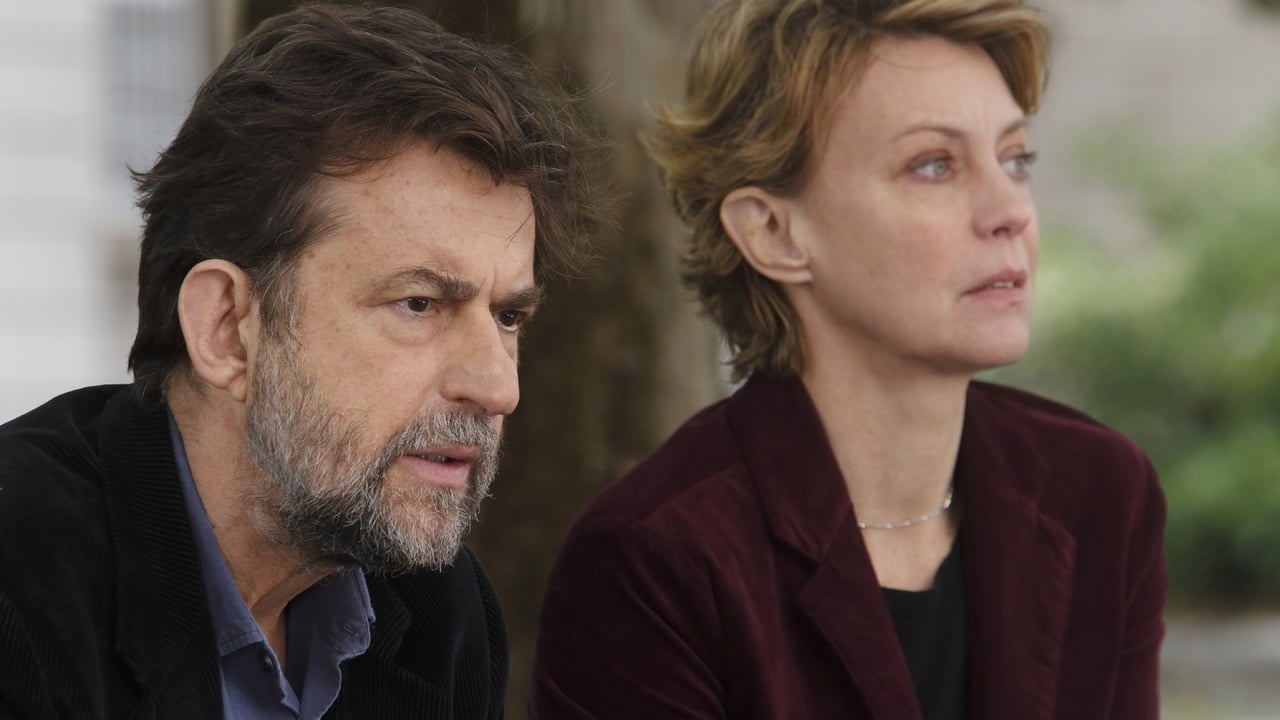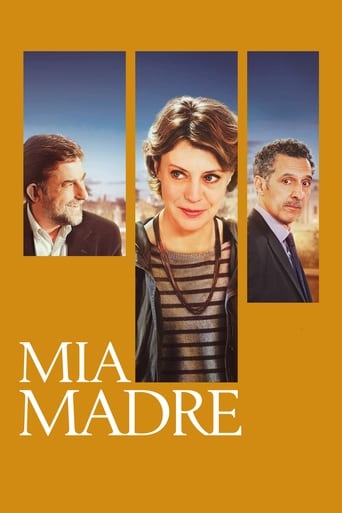

Director Nanni Moretti often stars in his own movies, frequently playing what seems to be only a thinly fictionalised version of himself. In 'Mia Madre', however, he has two alter egos, as he plays the brother of a film director, the excellent Marghertia Buy, who's busy with work, even as their mother is dying. The film is both a sensistive portrait of how we deal with terminal illness, and a revealing, and often hilarious, look at the business of film-making. John Turturro is the difficult American star of the film-within-a-film; the humour lies in Buy's reactions to his outrageous behaviour. I quite like most of Moretti's movies; but I think this one is my favourite.
... View MoreThe Italian movie Mia Madre (2015) was shown in the U.S. with its original title. It was co-written and directed by Nanni Moretti. It stars Margherita Buy as movie director Margherita. Margherita is directing a film in which noted U.S. actor Barry Huggins (John Turturro) is the protagonist. Margherita's mother Ada is portrayed by Giulia Lazzarina. Director Moretti has cast himself in the supporting role of Giovanni, Margherita's brother.Margherita has problems that come from many directions. Her mother is dying--that's really the crux of the plot. She and her brother do their best for her, but it's a slow, downhill battle. Margherita breaks up with a long-time lover, her daughter from her marriage is having trouble in school, and Barry Huggins is a self-centered jerk. Huggins is a star, and he acts like one. (In the movie, he speaks Italian well, which may be true in real life as well.) I got the sense in the movie that he was a celebrity, but not as great a celebrity as he would like to be. In any event, he is making Margherita's life miserable.Margherita can't just drop everything to be with her mother. She has a film to direct, and it's not going well. She's in an impossible bind.Director Moretti gave himself an important supporting role. In fact, the one fault I found with Mia Madre was that Moretti has a long scene with his boss that makes no sense in the context of the film. However, that small self-indulgence is negligible compared to all the great moments Moretti gives us.Turturro is brilliant. His job is to make everyone--including the audience--dislike him. He does that wonderfully. Margherita Buy is an absolutely brilliant actor. Her emotions are at the surface, and her face portrays each emotion with unbelievable precision. She is the Italian Meryl Streep . (Or Meryl Streep is the American Margherita Buy.) Even if this weren't a great movie, it would be worth seeing just to watch Margherita Buy act. However, it truly is a great movie, and I highly recommend it.This is one of the rare films that shows three generations of women, all of whom are strong and intelligent. That's another reason to watch Mia Madre.We saw this film at the acclaimed Dryden Theatre in the George Eastman Museum in Rochester. I don't know if it will go into general release. It's certainly worth seeking out. (Every movie is better seen on the large screen than the small screen, but Mia Madre will work well on a small screen.)For reasons I don't understand, Mia Madre has a modest 6.9 IMDb rating. This is one of those situations where I say, "Did those people see the same movie I saw?" Find it, watch it, and then judge for yourself.
... View MoreIn My Mother director Nanni Moretti examines three generations of women as they attempt to find their identities and make their lives. The title emphasizes the grandmother, as her heart weakens and she loses hold on her mind and body. Her teaching Latin stressed the discipline of structure — in a sentence, hence in life — but she also knew when to cut loose and dance with her students. One remembers that she taught them life as well as Latin. In another Latin lesson, she urges a nuanced sensitivity to verbs. Nouns are easy enough, the given, but what counts is what we do, the verbs, the actions that we choose to define us and our lives. Her granddaughter is a teenager just adopting the Latin discipline. She is already negotiating her relationships with her divorced parents. When she gets her scooter she learns that riding it requires care but also a loosening up and a leaning in. It's an emblem of the balance she needs to move along in life — as granny balanced discipline with dance. For want of that discipline, the girl's school term was ruined by a heartbreaking love. The central character is the girl's mother, Margherita, a film director trying to make a labour drama while dealing with her mother's decay and death. An ex-lover actor says that she's too insensitive to others and too willful to get along. Her problem lies in the instruction she gives her actors: "Play the actor as well as the role." The actors don't understand that and she admits she doesn't either. A director normally asks a director for total immersion in the character. But in her life Margherita lives detached from others. That's why her two relationships ended, why she didn't know about her daughter's heartbreak, why she only now learns what values and esteem her mother commanded. In contrast to these three strong women are two weak men. John Turturro plays the comic butt, an American actor whose ego dwarfs his abilities and record. As he struggles with the language and the lines he's a caricature of playing the actor instead of the role. Director Moratti himself plays Margherita's brother, embodying the ineffectuality usually ascribed to the women in a male-cantered drama. The devoted son takes a leave of absence from his job, then quits it altogether, despite being warned how hard it will be for a man his age to find another. Driven to fulfil the noun, devoted son, he withdraws from the constructive and responsible verbs or actions, leaving himself helpless. The last word of the film is Margherita's memory of her mother saying "Tomorrow," when asked what she's thinking. Her daughter and granddaughter have learned from her how to face the future. Her son backed away.
... View More"Mia Madre" is a slow burner. Don't expect to appreciate the movie or even understand its point until at least half way.To simplify, Moretti's films can roughly be divided into two categories: social satire (La messa è finita, Red Lob, The Caiman) and intimate works (Cario diario, Aprile, The Son's Room). "Mia Madre" combines both. Some of his films are mostly funny (Red Lob, Caro diario, Aprile, The Caiman), some are sad (La messa è finita to some extent, The Son's Room). Again, "Mia Madre" is between the two. (Side note: to those of you who haven't seen it, I strongly recommend "La messa è finita", for me Moretti's best so far.)These elements (social/intimate, funny/sad) slowly build up and reach full speed in the second half of the movie. *** WARNING: CONTAINS SPOILERS ***"Mia Madre" actually has two stories: the shooting of a film in a factory which provides the social, humorous touch and the illness of the director's mother with intimate, sad tones (this is based on Moretti's own experience, as he lost his mother in 2010 while shooting his previous movie). The link between the two is the director, Margherita, who is struggling with both as well as with her emotions (lover, daughter, sometimes brother). With her mother dying, she tries to find sense in her work and her personal life without much success. As spectators we then wonder what is the meaning of her life, and of life in general."Bring me back to reality!" shouts the American actor Margherita hired (John Turturro, excellent in being a lousy performer). Then, in the following image her mother is in the hospital. Is this reality, suffering and death? Are we sure we do not prefer fiction? Well, seeing as the shooting of the film goes in the factory, maybe not. These "film scenes" are a direct reference to the Italian social cinema that was dominant from end of WWII to approximately the 70s, and which inspired Moretti throughout his career. But the shooting falls flat: problems cumulate, the plot looks simplistic, dialogues sound silly, characters are caricatures. However we are not sure here if Moretti is criticising the uselessness of the film being made or the fact that nowadays society is not any more willing to accept such films, despite the accuracy of their themes (crisis, takeover, redundancies). Regardless, the scenes with Turturro provide some comical relief, notably the hilarious sequence where he drives a car.So what other relief from reality is there? Dreams maybe? Sometimes we are not sure if "Mia Madre" is reality or dream. But since the oneiric scenes look more like nightmares, they do not really constitute a good alternative to reality either. We see one of Margherita's dreams, but it looks frightfully real (people waiting in a huge line like statues). In another scene, Margherita's apartment is completely flooded and she has to move: this is filmed like a nightmare but is actually real. Likewise, once she has moved into her mother's deserted apartment, she cannot find papers and cries: a typical nightmare anguish where one cannot find what one is looking for. In yet another scene, to prevent her mother from driving, she tears her driver's licence and deliberately crashes her car in front of the terrified old lady; yet it is impossible to figure if this violent scene is real or not."Mia Madre" also freely mixes linear narration and flashbacks without transition, hence we sometimes are not sure where scenes fit chronologically. Notably, the movie ends with a replica from the mother who already passed away, and we don't exactly know when this happened. Here is probably the metaphorical meaning of Margherita asking her actors to be at the same time "inside and outside their characters": we are both inside and outside reality and time. Likewise, Margherita seems to be inside and outside of life, partly failing her work, her sentimental life, helplessly seeing her mother drift away. So just like Margherita, as spectators we are a bit lost in the mix of reality vs dream and present vs past. To add to the confusion, the movie's tone is double-sided as we have seen.A relief in knowledge then? Margherita's mother is a former Latin teacher (just like Moretti's used to be) and despite her illness manages to help and interest her granddaughter. Latin: a useless old language in our modern society, somewhat like the film Margherita is shooting but useful for thinking and understanding, as she tries to explain to her daughter. Also, the mother's former students are so grateful for her teaching that they come after many years to thank her even if, in a typical Moretti's ironical twist, they are too late. So the mother's knowledge will be gone, but will partly survive with the next generations. This might be the final message of the movie, one of hope despite the sad undertone of the last replica: "What are you thinking about?" Margherita asks her mother – "Tomorrow", she answers calmly (in Italian, "Domani" is even more beautiful) even though for her there is no tomorrow, and the movie ends. Non c'è domani.
... View More